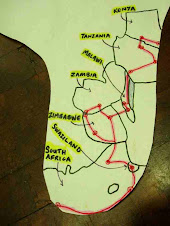Women’s Struggles and Heroisms
 I went to a fun session about women’s struggles and stories. It was filled with women from various countries sharing poetry, stories, songs and dance. It began with two women, one from Korea and one from India, blessing the space. Then women from all over the world shared poems, songs and stories.
I went to a fun session about women’s struggles and stories. It was filled with women from various countries sharing poetry, stories, songs and dance. It began with two women, one from Korea and one from India, blessing the space. Then women from all over the world shared poems, songs and stories. Actually, one man also stood up to speak: the former President of Zambia! There he was, sitting in the middle of the crowd… and he got up to honor the mothers of the world. He spoke beautifully, told a story and even sang – all to celebrate and thank mothers.
Actually, one man also stood up to speak: the former President of Zambia! There he was, sitting in the middle of the crowd… and he got up to honor the mothers of the world. He spoke beautifully, told a story and even sang – all to celebrate and thank mothers. A Philippino woman shared a powerful poem about Nestle Corp… “You faithful shoppers, unknowingly crossing the picket lines… your coffee, your milk, your cup, your water, even your dog food—all Nestle Corporation. It is all poisoned by the blood of every union leader who was slayed.”
A Philippino woman shared a powerful poem about Nestle Corp… “You faithful shoppers, unknowingly crossing the picket lines… your coffee, your milk, your cup, your water, even your dog food—all Nestle Corporation. It is all poisoned by the blood of every union leader who was slayed.”
Another Philippino woman spoke of political executions… “how easily a life can be taken.”
A group of Zambians sang a song about resisting domination. One wom an, referring to the WSF, told us: “We started with no resources and look, we have brought you all here. Look, we smile in the slums, even if we have nothing. This is our story.”
an, referring to the WSF, told us: “We started with no resources and look, we have brought you all here. Look, we smile in the slums, even if we have nothing. This is our story.”
A Korean woman then got up and taught a song that we sing back home: “She changes everything she touches, everything she touches changes.” Fun!
A Colombian woman told a story of their 40 years of struggle against corruption, unemployment, neoliberal economics. “U.S. interests have been the priority.” She also told of the systematic assassinations of union leaders, journalists, students, professors, anyone in any form of resistance. This is Hilda from Uganda... I met her while we waited for the workshop to begin, She started a women writer’s organization and over the last few years they have published many women writers and taught classes. But she said that Uganda is not a reading culture so it’s hard to sell the books. They rely on donations and a small market in Europe.
This is Hilda from Uganda... I met her while we waited for the workshop to begin, She started a women writer’s organization and over the last few years they have published many women writers and taught classes. But she said that Uganda is not a reading culture so it’s hard to sell the books. They rely on donations and a small market in Europe.


No comments:
Post a Comment